| EQUINETOURISM - WORLDWIDE - Horse & Ponies of the World - Donkeys |
| Donkeys - their history and heritage and place in the world today |
There are estimated to be 59 million donkeys and mules in the world today, many of them to be found in developing countries. Their ancestors were the wild asses from Africa and Asia. The UK-based Donkey Sanctuary works throughout the world helping to improve conditions for working donkeys and mules.
|
|
|
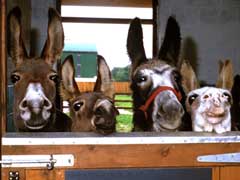 |
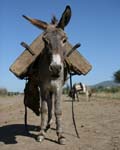 |
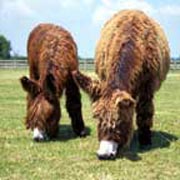
The Pitou Donkeys of France |
Donkeys come in all shapes, sizes, colours & textures. The most common coat colour is grey, followed by brown, black, roan and broken coloured donkeys (a combination of brown-and-white or black-and-white markings) - the rarest colour is pure white. There are many different colours, sizes & shapes of donkeys & one of the most distinctive is probably the Poitou donkeys. They originate from France and stand at 14 to 15 hands. They have a thick coat which traditionally is matted, tangled and brown bay in colour. |
|
History of the Donkey
The donkey's ancestors were wild asses from Africa and Asia. The African branch of the breed were found between the Mediterranean coast and the Sahara Desert to the south of the Red Sea. There were two separate species: the Nubian wild ass and the Somali wild ass. The Asiatic branch of the breed came from a much larger area stretching from the Red Sea to Northern India and Tibet where the ass had to adapt to different climate, terrain and altitude. Consequently there is more than one type of Asiatic wild ass. The further east the ass was found, the larger, heavier and stronger the animal became. Sadly many of these original breeds are now extinct, due to cross breeding and the decline of the use of the donkey, particularly in the Western World.
Donkeys were among the draught animals used to carry silk from the Pacific Ocean to the Mediterranean along the 'Silk Road' in return for trade goods. The overland route was approximately 6,400km and lasted several years. No single animal completed the entire journey and mixing of breeds occurred as unplanned matings happened en-route. The journey ended in the Mediterranean ports of Greece, Italy, the Middle East and Alexandria in Egypt.
In Greece donkeys were found to be ideal animals for working on the narrow paths between the vines. Their use for cultivation in vineyards spread through the Mediterranean countries to Spain, whose coast at the southern tip is separated from North Africa by only a few miles - possibly another entry route for the African wild ass.
The Roman Army was responsible for the movement of donkeys into Northern Europe. Donkeys were used in agriculture and as pack animals. The Romans used donkeys in their new vineyards, some planted as far north as France and Germany. Donkeys came to England with the Roman invasion of Britain in AD 43.
Working Worldwide for Donkeys
The Donkey Sanctuary works throughout the world helping to improve conditions for working donkeys and mules.The Donkey Sanctuary currently has projects in Ethiopia, India, Kenya, Egypt, Mexico, Spain and other European countries. The projects vary from research into tropical diseases of both national and international importance, to mobile clinics and sanctuaries providing free clinical treatment and advice on management, husbandry and nutrition in donkeys and mules. The Donkey Sanctuary is also engaged in investigations of transportation methods of donkeys and mules throughout Europe.
There are an estimated 59 million donkeys and mules in the world today and the majority are to be found in developing countries. Incessant droughts resulting in increased cattle mortality have contributed to an increase in donkey usage as draught and pack animals in both rural and urban areas.
Donkeys are used for work and in many circumstances are a lifeline to families in their everyday tasks, such as water, and wood fuel collection, land cultivation and transportation of produce to market.
| How to Adopt a Donkey - Why 'Adopt a Donkey?' |
| By adopting a donkeys for one year, you will be helping toward the running costs of The Donkey Sanctuary's sister charity, The Elisabeth Svendsen Trust for Children and Donkeys (EST) which provides riding therapy for children with special needs and disabilities. |
How much does it cost?
The ESTadoption fee is £15 per year and you will receive details of the donkey you decide to adopt, together with a beautiful drawing, an adoption certificate and a twice yearly report. A video and DVD of the donkey group is also available. (VHS video £5 - NTSC video £10 - DVD £6.50) |
How do I adopt? Visit www.thedonkeysanctuary.org.uk for details
You may adopt a donkey either online or via the post through The Elisabeth Svendsen Trust for Children and Donkeys . There are 4 adoption donkeys at each centre - Birmingham, Sidmouth, Leeds, Manchester and Ivybridge. Visit www.elisabethsvendsentrust.org.uk for more details. |
About The Donkey Sanctuary
Just outside the town of Sidmouth, in Devon, The Donkey Sanctuary is home to around 500 donkeys. Set in unspoilt farmland and countryside, visitors return time and again to meander among the donkeys and absorb the serene and relaxed surroundings.
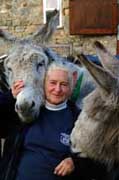 |
The Donkey Sanctuary was founded by Dr Elisabeth D Svendsen, MBE in 1969 and was registered as a charity in 1973. The aims of The Donkey Sanctuary are to prevent the suffering of donkeys worldwide through the provision of high quality, professional advice, training and support on donkey welfare. In the UK and Ireland permanent sanctuary is provided to any donkey in need of refuge and the Donkey Sanctuary has taken over 12,000 donkeys into its care. |
|
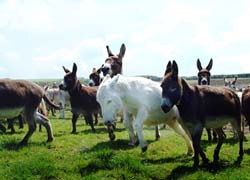

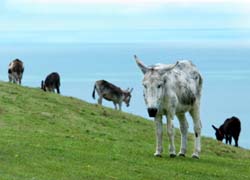

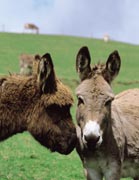
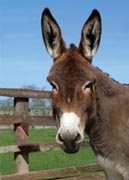

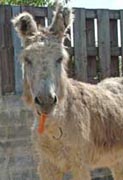
|
No donkey is ever refused admission to the Sanctuary - provided it has a certificate of fitness to travel, and each donkey is guaranteed a life of loving care and attention. The charity never buys or sells donkeys, and it has a non-breeding policy. There are thousands of mouths to feed daily, as well as the costs involved in running its 10 farms dispersed throughout the UK and Ireland where the donkeys reside.
Through a dedicated team of 60+ Welfare Officers the Sanctuary is able to investigate reports of cruelty to or neglect of donkeys, quickly and efficiently. Free advice and training courses on donkey care and management is available.The Sanctuary has an excellent veterinary clinic designed specifically for treating donkeys, which also provides a ‚Äúfree of charge‚ÄĚ haematological and biochemical (blood and dung sample) analysis service to any veterinary surgeon in the UK and readily offers veterinary advice about donkeys on a worldwide scale.
Overseas, teams of staff are helping literally hundreds more donkeys every day, by providing free veterinary treatment and giving practical advice to the owners who are dependent on their animals. In total in 2004, the Donkey Sanctuary provided over 127,797 treatments to donkeys and mules in developing countries.
More recently, the Donkey Sanctuary has established a Spanish branch in Fuente de Piedra, near Malaga in Spain. El Refugio del Burrito has taken over 68 donkeys into its care, the first one rescued being Romero, who had been used as a donkey taxi carrying tourists around the town of Mijas on the Costa Del Sol. Every donkey arriving at the rescue centre is granted a life of loving, expert care and attention
.The Donkey Sanctuary will also investigate and monitor events in Europe such as festivals, tourist industries using donkeys, markets and the transportation conditions of donkeys going to slaughter. If necessary the charity will campaign for the rights of donkeys.
The Donkey Sanctuary depends entirely on donations from its supporters in order to continue with its vital work worldwide. Approximately 6p in every £1 donated is spent on administration costs, which means that the majority of all donations received goes directly to helping the donkeys.
Photography and editorial sourced and reproduced by kind permission of The Donkey Sanctuary |
| For More information |
Sourced with kind permission of The Donkey Sanctuary
Telephone 01395 578222 Fax 01395 579266
email [email protected]
www.thedonkeysanctuary.org.uk
The Donkey Sanctuary, Sidmouth, Devon EX10 0NU
For more information on the Elisabeth Svendsen Trust please visit:
www.elisabethsvendsentrust.org.uk
|
|
BACK TO EQUINETOURISM.CO.UK WORLDWIDE HORSE HOLIDAYS FRONT PAGE
|
|
  Horse riding holidays, equestrian events and shows, horseback vacations, equine directory, good horsemanship, horse holidays, uk and worldwide
 
ADVERTISE on Equinetourism.co.uk - Click here
SEARCH FOR CONTENT ON EQUINETOURISM.CO.UK |
Also see www.EquineTourismCommunity.com and www.EquineTourism.com
email: [email protected] - Telephone 00 44 (0)1643 862785
www.EquineTourism.co.uk is owned by Happy Horses Ltd, Holt Ball, Luccombe, Minehead, Exmoor, Somerset TA24 8SZ
Full worldwide copyright and all rights retained ©2004-2014 ongoing Happy Horses Ltd. Please read our Disclaimer
|
